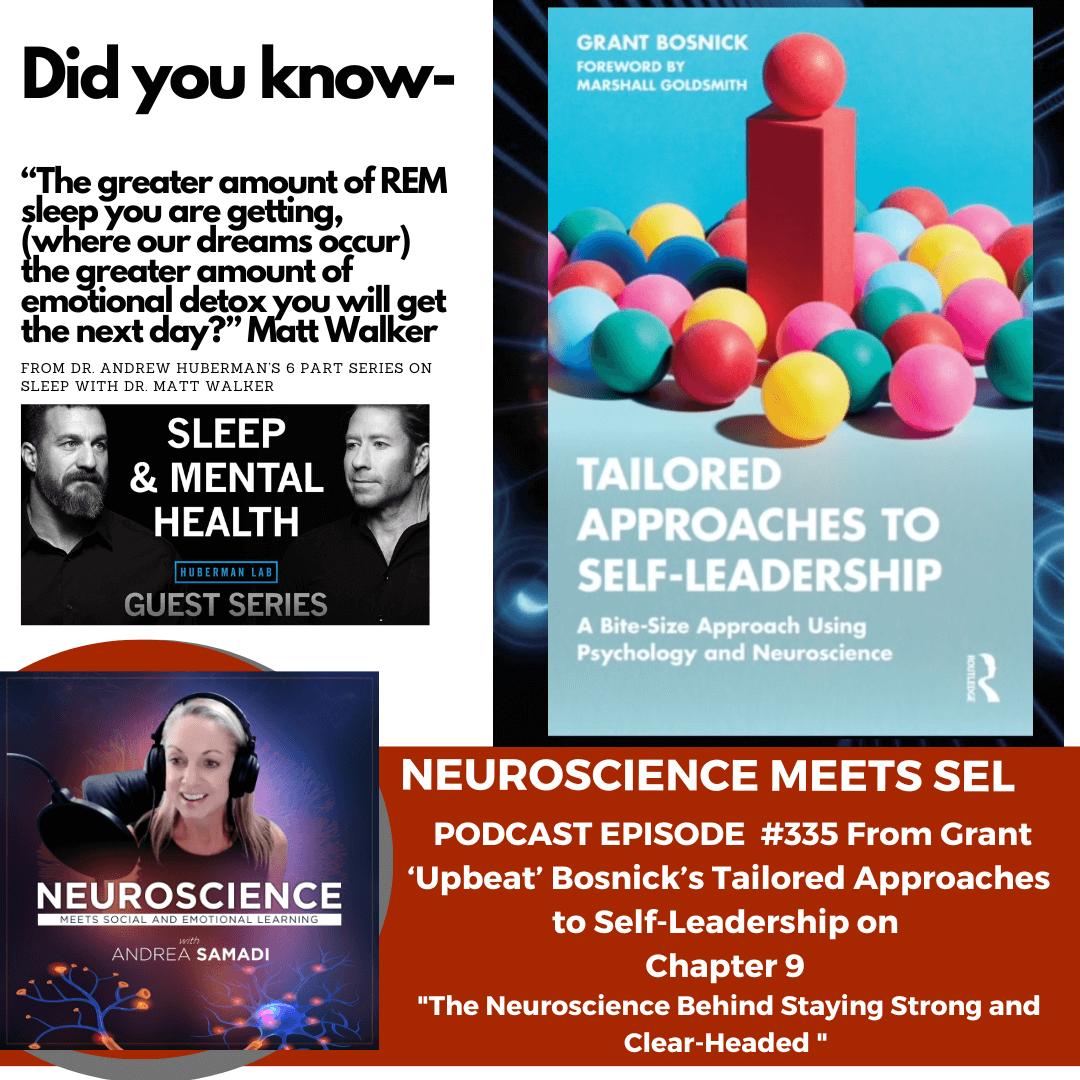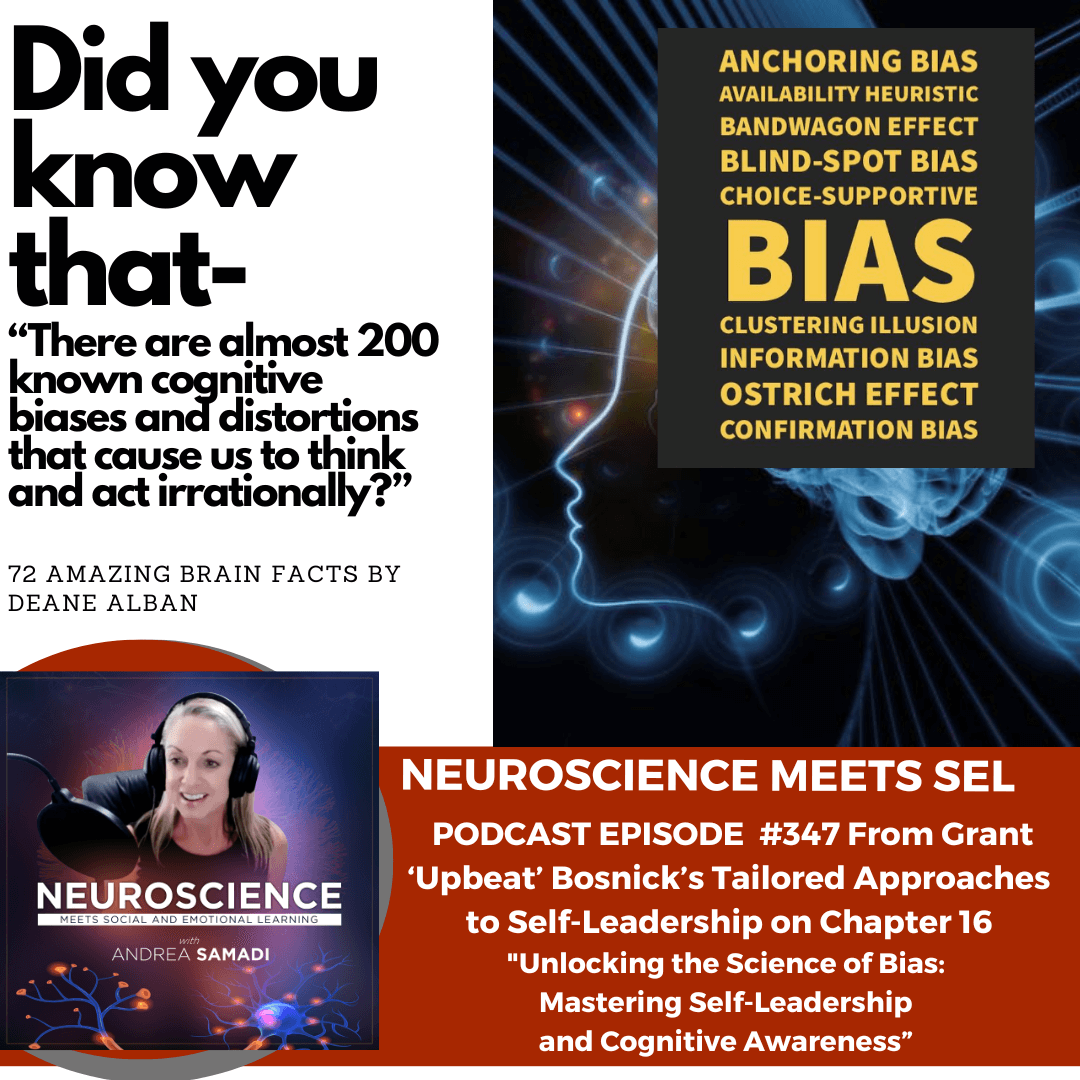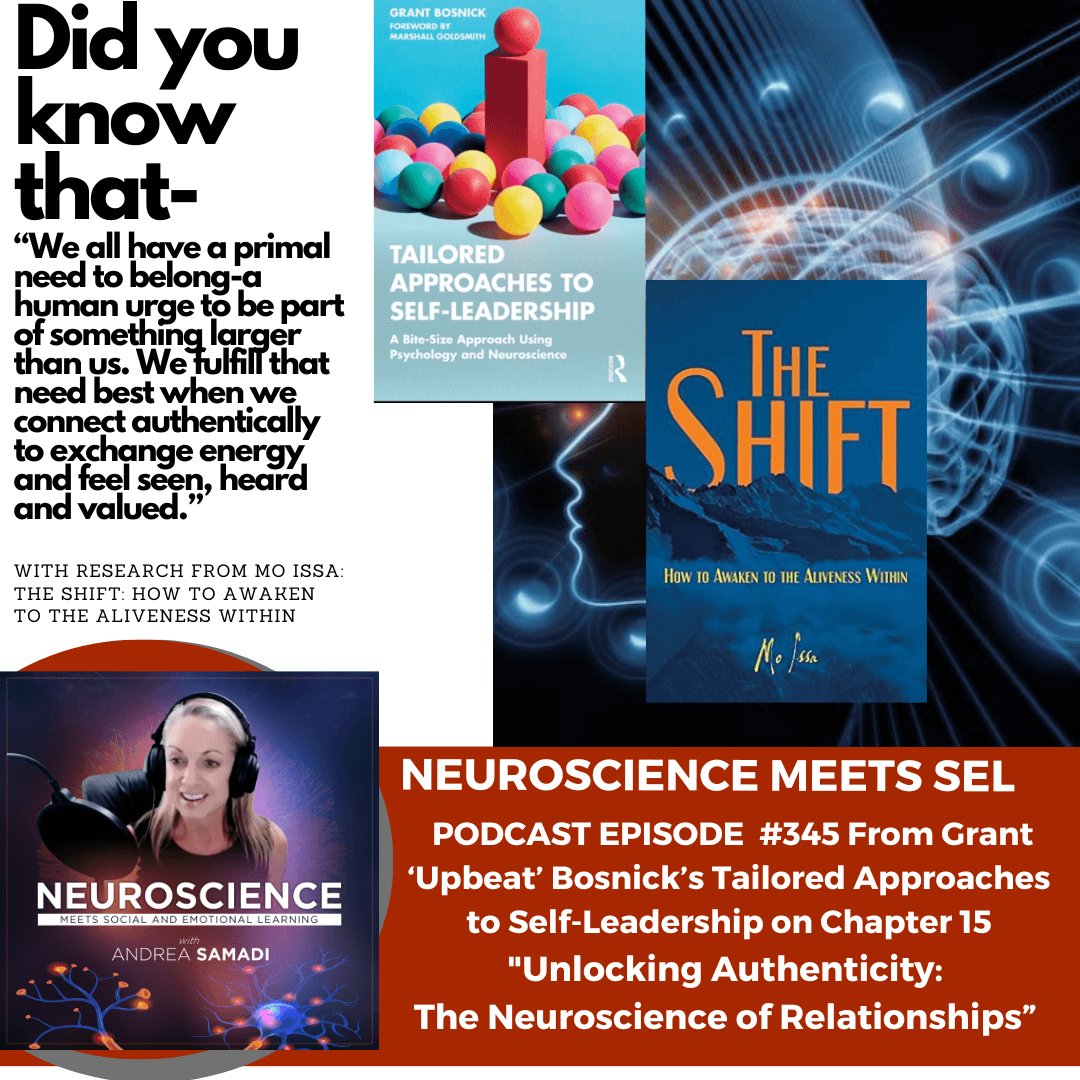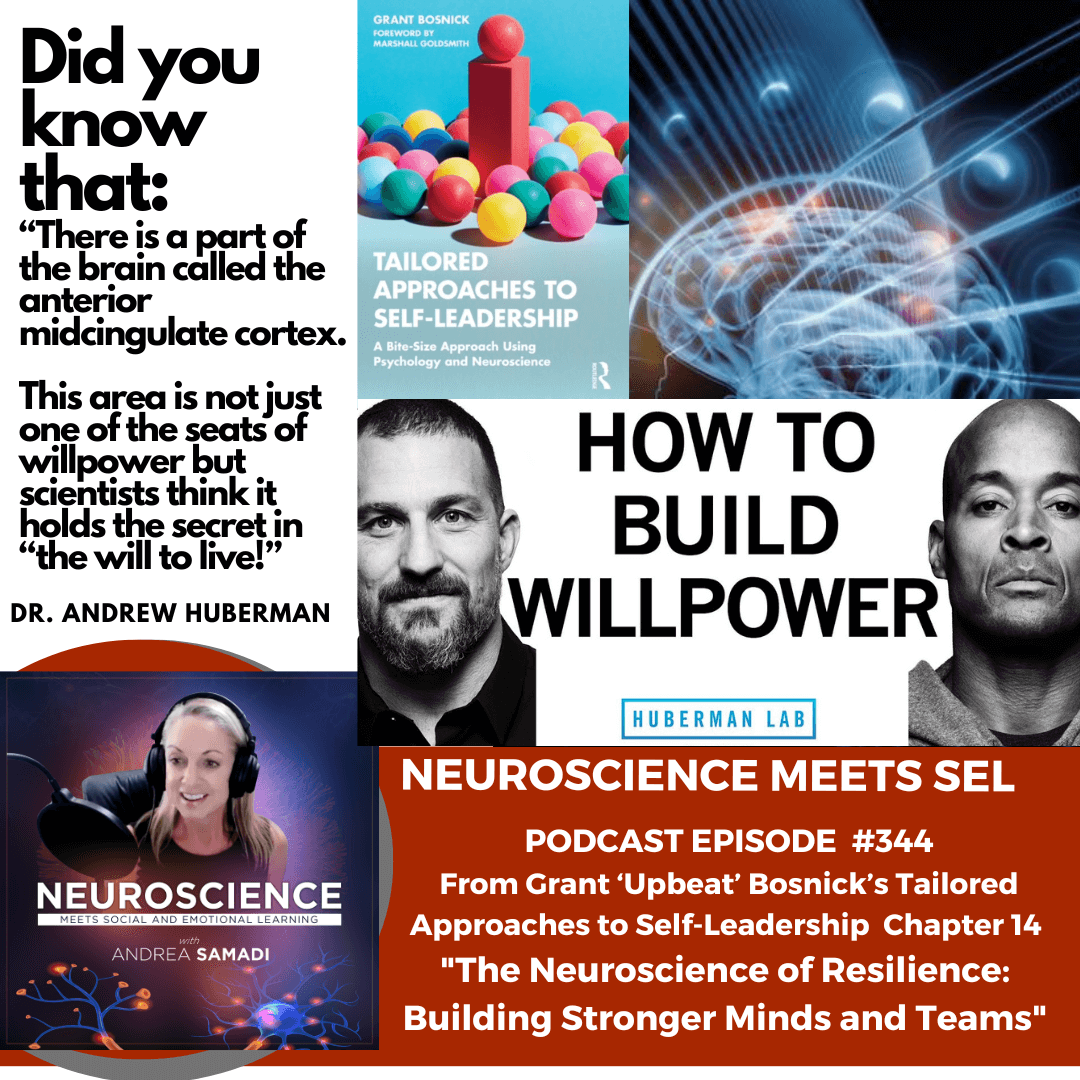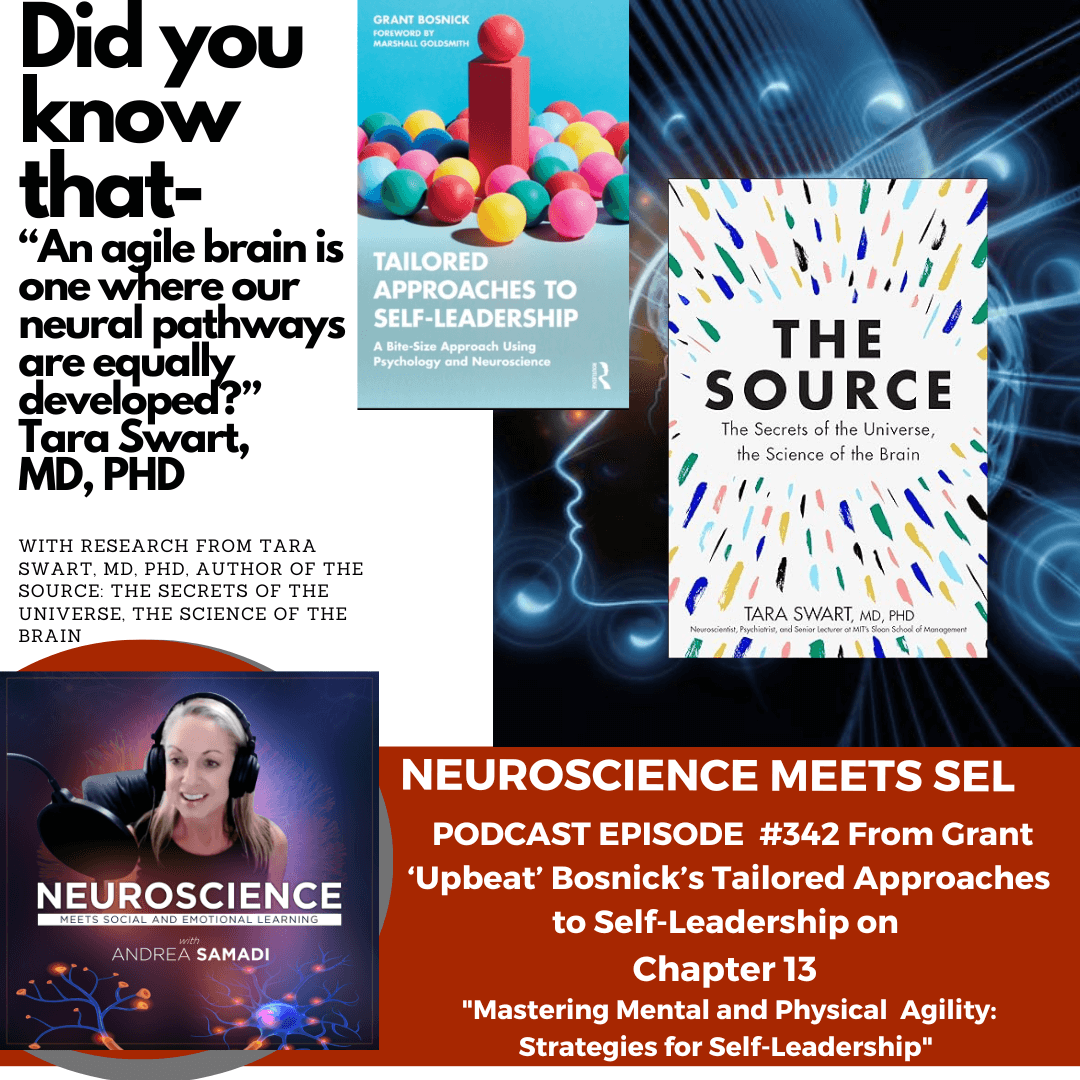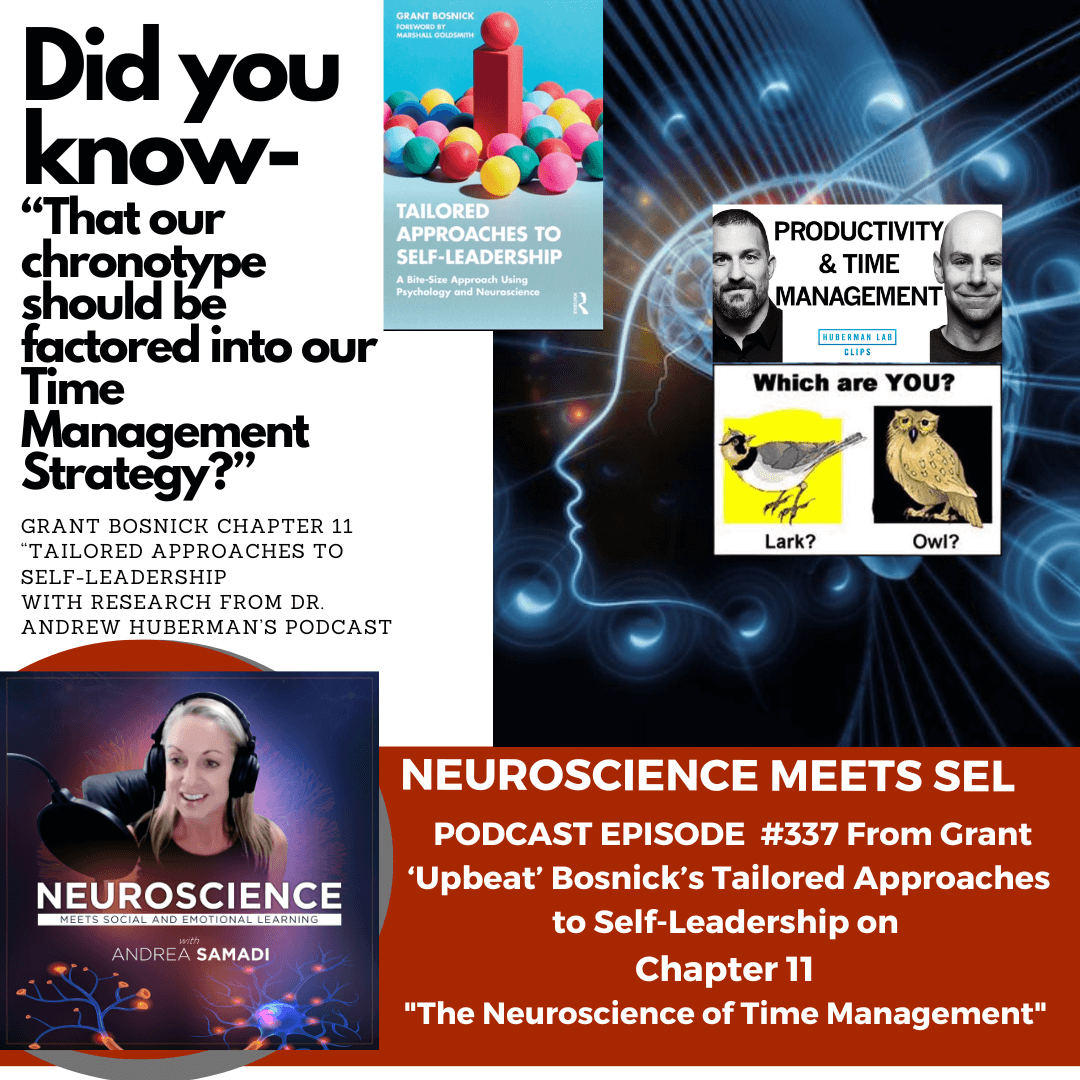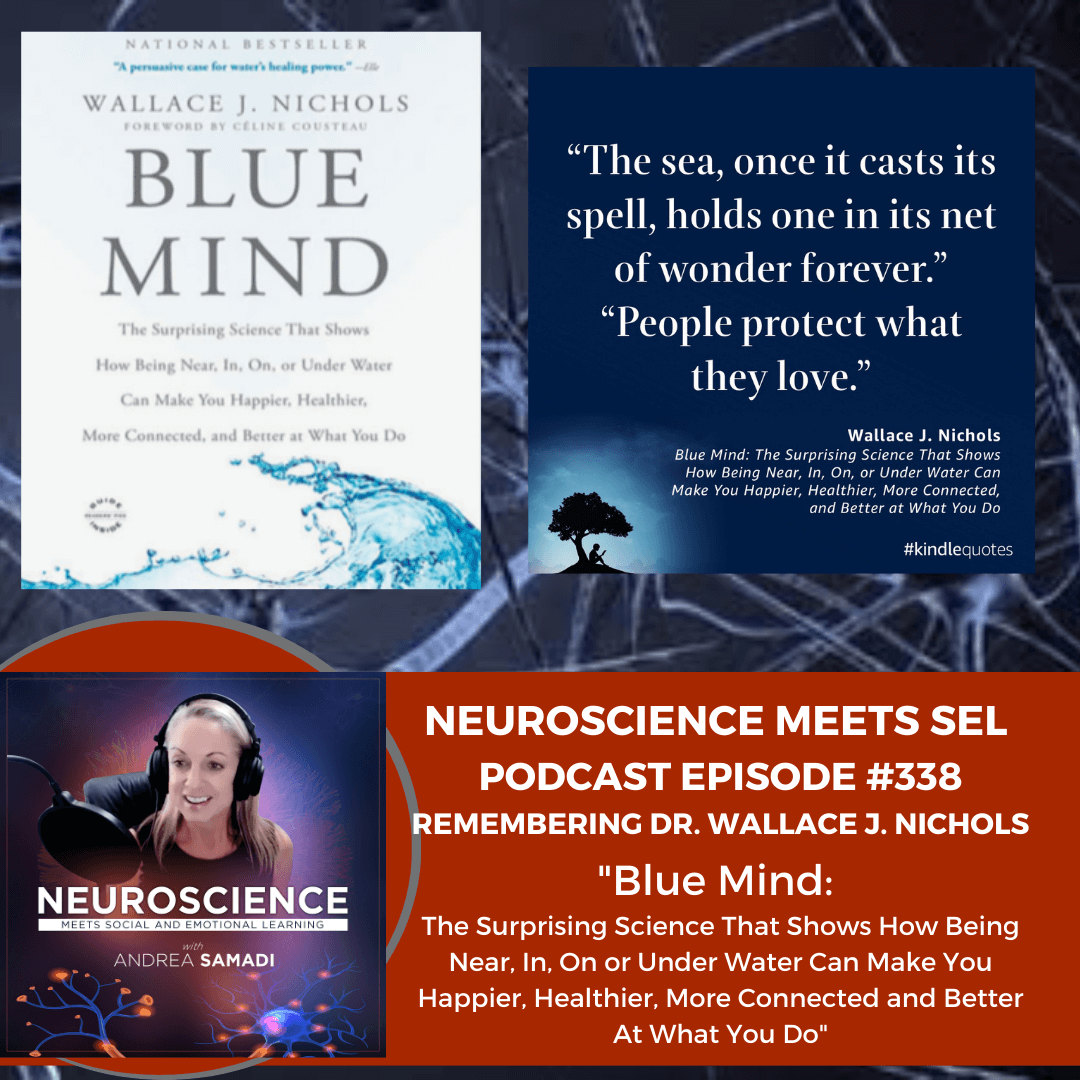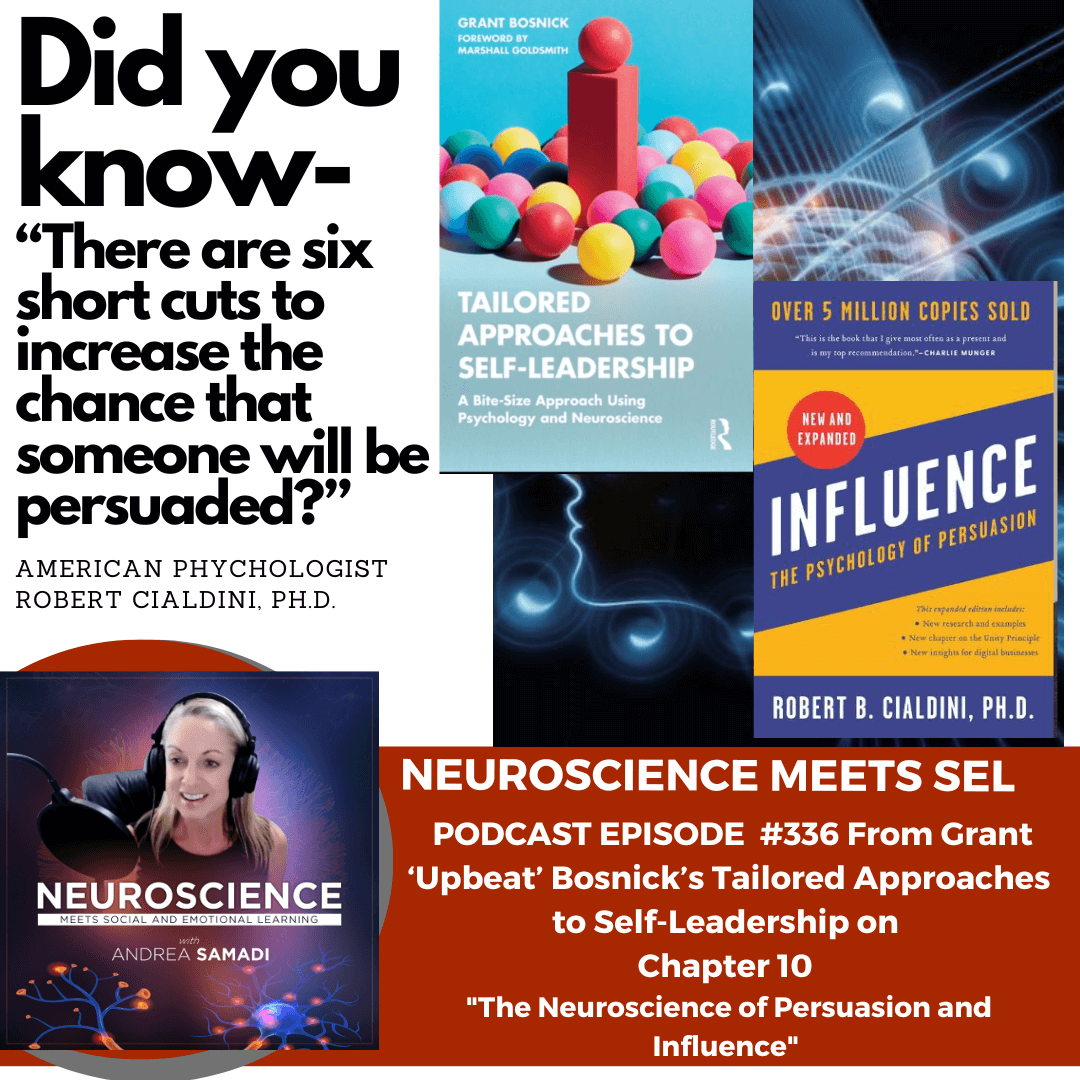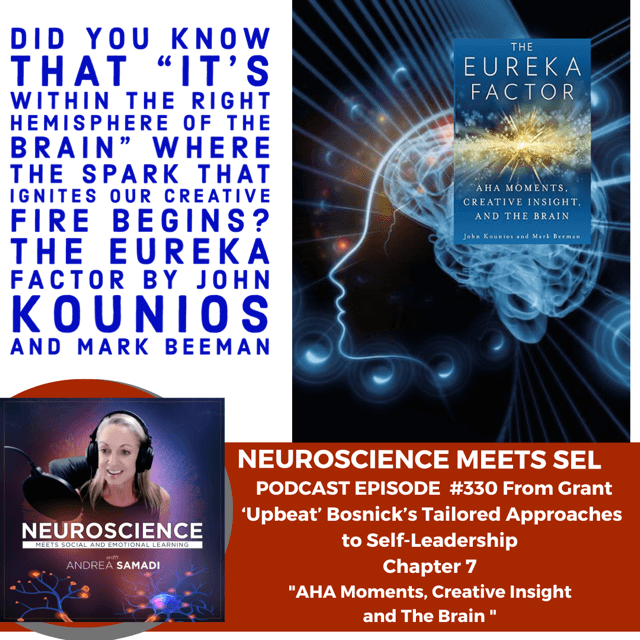Insights from Grant 'Upbeat' Bosnick "Emotion Regulation: The Neuroscience Behind Staying Strong and Clear-Headed" Chapter 9
Description
Welcome back to Season 11 of the Neuroscience Meets Social and Emotional Learning Podcast! In episode 335, we delve into the neuroscience of emotion regulation, a crucial skill for personal and professional success. Host Andrea Samadi continues the 18-week self-leadership series inspired by Grant Bosnick’s book, focusing on strategies to enhance our ability to manage emotions effectively.
We explore practical tips from Bosnick, such as labeling emotions, creating distance from them, and reframing situations to view them more positively. Additionally, we highlight the importance of sleep for emotion regulation, drawing insights from experts like Dr. Andrew Huberman and Dr. Matthew Walker. Discover how improving your sleep quality can lead to better emotional control and overall well-being.
Join us as we connect the dots between neuroscience, sleep, and emotional intelligence to help you achieve greater heights in 2024 and beyond.
On today's episode #335 we continue with our 18-Week Self-Leadership Series based on Grant Bosnick’s “Tailored Approaches to Self-Leadership: A Bite Size Approach Using Psychology and Neuroscience” that we first dove into with our interview on EP #321[i] the end of January. The goal was that each week, we focused on learning something new, (from Grant’s book) that builds off the prior week, to help take us to greater heights in 2024.
For Today, EPISODE #335, we are moving on to Chapter 9, covering “The Neuroscience of Emotion Regulation” which showed up on my leadership self-assessment as a low, RED score, of 20%, but again, not because it’s not something I don’t need to pay attention to, this is something I pay attention to daily, right up there with physical health that is listed in Pathway Four of Grant’s Self-Leadership Map.
If you’ve taken the leadership self-assessment[ii], look to see if Emotion Regulation is of a low, medium or high priority for you to focus on this year.
Before looking at what Grant Bosnick has to say about Emotion Regulation in Chapter 9 of his book, I looked around to see what else I could find on this topic.
We actually have already covered this topic as one of the six social emotional learning competencies that we launched this podcast with, back in August, 2019[iii] and we called that episode “Self-Regulation: The Foundational Learning Skill for Future Success.” In this early episode, we defined self-regulation as “the ability to manage your emotions and behavior in accordance of the situation. It includes being able to resist highly emotional reactions to upsetting stimuli, to calm yourself down when you get upset, adjust to a change in expectations and (the ability) to handle frustration”[iv] In other words, it’s the ability to bounce back after a setback or disappointment, and the ability to stay in congruence with your inner value system.
HOW TO HELP OUR CHILDREN WITH EMOTION REGULATION:
We covered some tips on this early episode to help our children to practice this skill, and strengthen their “self-regulation” muscles, beginning with:
- Naming the emotion they are experiencing at a given moment, with a strategy (like stopping to take some deep breaths when something frustrates or overwhelms them) so they can keep working, and move forward.
Uncovering what motivates each of us to develop intrinsic motivation that can help propel us forward.
Taking brain breaks, or “unfocused moments” that allow for the brain to solve problems during these resting states.
WHAT GRANT BOSNICK SUGGESTS FOR EMOTION REGULATION:
Then we covered some tips to help us to continue to strengthen these self-regulation skills in the workplace, and I wondered what Grant Bosnick had to say in chapter 9 of his book on this topic. Within the second paragraph of this chapter, he explains the science behind emotion regulation when he outlines that “neuroscience has shown us that the exact same feelings we get from a physical threat also occur as social and emotional threats.” (Page 91, Chapter 9, Emotional Regulation, Bosnick). This took me back to working with children with this foundational learning skill, that determines future success, and the whole idea that “social and emotional threats” can impact us (stop us in our tracks) exactly as if there was a actual physical threat (like coming face to face with a bear in the forest).
In Chapter 9, Grant explains some different ways to regulate our emotions, and he uses a graphic to demonstrate how to move forward, while regulating our emotions, instead of spiraling out of control, downwards, and it begins with where we focus our attention. If we focus on the emotional aspects, he tells us “it will drive us into a downward spiral” but if we learn to “focus on the nonemotional aspects, or distance ourselves (from whatever it is that is bothering us) this is the start to creating an upward spiral.” (Page 94, Chapter 9, Emotional Regulation, Bosnick).
IMAGE CREDIT: Image 9.2 from Grant Bosnick's Tailored Approaches to Self-Leadership
TIP 1: LEARN TO LABEL OUR EMOTIONS:
Bosnick agrees with the steps we created to build emotion regulation in our children, as he also mentions the importance of being able to name or label the emotion that you are having first.
TIP 2: DISTANCE YOURSELF FROM EMOTIONS THAT ARE BOTHERING YOU TO PROVIDE TEMPORARY RELIEF: Then he suggests to find ways to distance yourself from the emotion (he calls this attentional deployment) to give you temporary relief from the situation. He mentions seeing the issue through someone else’s eyes, and I remember Dr. Maiysha Clairborne sharing this strategy back on EP 289[v] when she explained the importance of stepping into someone else’s shoes when you are in conflict with them, to feel what they feel, and even stepping back and looking at the entire problem from above (outside of anyone’s shoes) to gain a new perspective.
TIP 3: REFRAME THE CONFLICT: Next Bosnick suggests “reappraisal or reframing” the conflict, by looking at it in a more positive way. He mentions that mindfulness can help us to “take a step back, lower anxiety, bring attention to the moment, become less judgmental about what is happening, help the brain to not attach meaning to the emotions and be open to new meaning and new connections.” (Page 97, Chapter 9, Emotional Regulation, Bosnick). He suggests looking at the situation from someone else’s point of view to reframe it.
TIP 4: LEARN TO REGULATE OUR EMOTIONS BY FINDING STRATEGIES THAT KEEP US STRONG, AND CLEAR HEADED: It’s his last technique of “response modulation” that caught my attention the most, because we’ve all experienced this. Once we are hit with an emotion about something, he asks “is it better to suppress it, or acknowledge it?” (Page 99, Chapter 9, Emotional Regulation, Bosnick). He says “when we feel strong, clear-headed and have executive control, it is better to acknowledge the emotion so we can regulate it.” (Page 100, Chapter 9, Emotional Regulation, Bosnick).
EMOTION REGULATION AND SLEEP:
So in a world where we are hit daily by external stimuli, how on the earth can we be proactive to stay mentally strong and clear-headed so we have improved executive control to manage our emotions and regulate them? This took me straight to the work of Dr. Andrew Huberman, and Dr. Matthew Walker who recently recorded an episode called “Improve Sleep to Boost Mood and Emotion Regulation.” [vi] It was here where I learned just how important sleep is for keeping a strong, clear mind, so we can use this strength to acknowledge and regulate our emotions, like Bosnick suggested.
Dr. Walker, a professor of neuroscience and psychology at the University of California, Berkeley and the host of The Matt Walker Podcast, gave example after example that proved that when you’ve NOT had a good night’s sleep, things that wouldn’t bother you (when you’ve slept well), begin to aggravate, or grate on you more.
Here’s what I found to be remarkable on this topic, something I had not ever heard before.
DID YOU KNOW that "The greater amount of REM sleep you are getting (where our dreams occur), the greater amount of emotional detox you will get the next day?" (Dr. Matthew Walker).
Dr. Walker went on to explain that “the brain chemical noradrenaline (that’s responsible for our stress reaction) completely shuts off during REM sleep, and serotonin (that plays a role with our mood) decreases, while acetyl choline (that carries messages from our brain to our body through nerve cells) increases by up to 30% in some parts of the brain (and can be even more active than when we were awake). Dr. Walker concluded that the decrease of stress related brain chemicals is what makes “REM sleep was the perfect condition for overnight therapy.”
If we want to improve our emotion regulation, the science is pointing directly to improving our sleep.
Diving deep into the 4 stages of sleep and suggestions to improve our sleep is something I’ve been working on for the past 5 years. There is a lot to this, and I’m still working on improving ALL the macroingredients of a good sleep (suggested by Dr. Walker), that include QQRT, or knowing the quantity (amount of sleep), quality (fragmented vs continuous), regularity (sleeping/waking around the same time) and timing (sleeping in alignment with my chronotype). Dr. Walker dives deep into all these areas with Dr. Huberman, and if you do wonder where you can improve, I highly suggest their 6-part series on sleep.
TIPS FOR IMPROVING EMOTION REGULATION BY IMPROVING OUR SLEEP:
Here are three tips that I took away from the neuroscience of self-regulation, that I’ve been working on, to see

